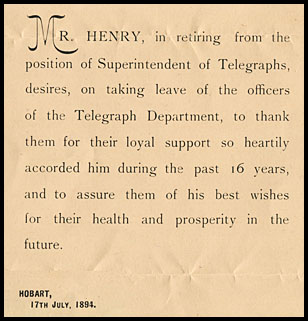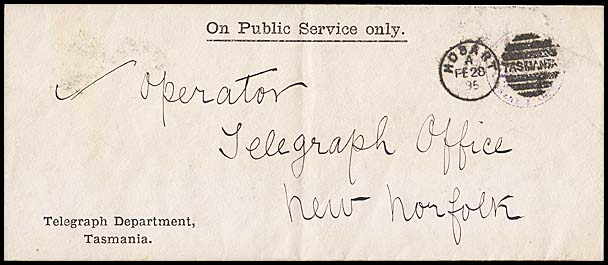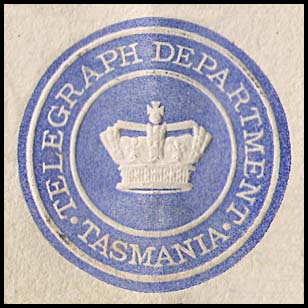Administrative responsibility for the telegraph services.
- Australia 1901-1988
- New South Wales
- Overview of NSW
- Telegraph lines
- Telegraph Offices
- Date stamps
- Forms
- Envelopes
- Instructional annotation
- Collect
- Delayed
- Free
- Immediate Urgent
- Reply paid
- Rates
- Stamps
- 1871 Telegraph stamps
- 1885 proposal
- 1893 proposal
The administrative responsibility for the telegraph can be summarised thus:
- the establishment of the Telegraph Department within the Dept of Public Works;
- the separation from Public Works;
- amalgamation with the Postal Department;
- transfer of responsibility to the Commonwealth after Federation.
1. Establishment of the Telegraph Department.
As noted elesewhere, the first telegraph line ran between Launceston and Hobart and it was constructed by a firm of Canadians - Messrs Butcher, Destage Butcher and Carroll. On the completion of the line, the senior partner - Mr. W. H. Butcher - accepted the appointment of Superintendent of Telegraphs as from 1 July 1857 and that appointment was gazetted on 18 August.
The Director of Public Works was Mr. W. M. Falconer and, by virtue of his position, he also became Inspector of Telegraphs. Hence, the Telegraph Department was organisationally under Public Works and the estimates came under the heading of "Civil - Public Buildings, Roads and Electric Telegraph".
"In 1859 at the age of 20, Frederick Augustus Gow Packer (the great-uncle of Sir Frank Packer, the media tycoon) was appointed to the Telegraph Department in Hobart. Previously he had been learning his skills in an unpaid capacity. Packer was quickly promoted to become Superintendent of Telegraphs, but really, there was not a lot of telegraph involved. Then there was only a single telegraph line spanning 170 miles, from Low Head in the north to the station at Mount Nelson in the south. Nonetheless by the time he had left the department in 1878 there were over 900 miles of line linking a network of 59 stations. Records of his time as Head of the Department indicated that he was a hard worker and a stern disciplinarian. He was also fair, instructing his staff how in the correct way fulfil their duties. He would tolerate no misbehaving and if a worker was caught playing tunes on the batter jars for the amusement of Hobart cab-drivers, it meant instant dismissal. Yet, he worked for better pay and conditions for his staff, stating “The duties of a Telegraphist require skill, constant care and attention and involve peculiar responsibilities and trust.” He was able to obtain, because of the increased telegraph traffic, a second line between Launceston and Hobart".
(See more at: http://tasmaniantimes.com/index.php/article/frederick-augustus-gow-packer-1839-1902-tasmanian-organist-and-composer#sthash.eD06C04T.dpuf).
The incorporation of the Telegraphs Department within the Department of Public Works began to create problems on many fronts by the 1870s. An example of this opposition was the article/Editorial published in The Mercury on 6 April 1871. This article, in part, points out that a person appointed to the position of Inspector of Telegraphs should at least have some understanding of telegraphs - a not unreasonable proposition. As examples, the article points to the problems in completing works by Public Works and problems with constructing bridges. The article can be read elsewhere - say starting at the Inspector of Telegraphs part (but feel free to read above also).
The Government notice issued on 8 June 1875 detailing the Rules and Regulations for the guidance of the Officers of the Electric Telegraph Department is included elsewhere.
In his final report before retiring in 1878, Mr. Packer noted:
"An amalgamation and re-modelling of the staff at the chief offices Hobart Town and Launceston has been long asked for. As this has now been arranged upon, many improvements will be made which it was quite impossible to carry out before; and many difficulties hitherto expressed will doubtless be overcome. But for the undying soul and energy of the officers at Hobart Town and Launceston, it would have been impossible with so small a staff to get through the enormously increased work of the department.
As the Government has done me the honour of offering me a more advantageous position in the public service, my long connection with the Telegraph Department will cease from 1st July coming. I cannot leave the department without expressing my sincere thanks to the officers for their courteous and ready aid they have rendered me in establishing telegraph services on the present important footing; and it is a great satisfaction for me to know that I carry with me the best wishes of all connected with it.
I have the honour to be Sir
Your obedient servant
F. A. Packer
Superintendent of Telegraphs.
2. Separation from Public Works.
Packer was succeeded by Mr. Robert Henry on 1 July 1878. One of Mr Henry's first official duties was to request a change in the responsibility for maintenance of the telegraph lines from the Public Works Department to the Telegraph Department. He was successful although the change took time to effect.
The House of Assembly convened on 19 July 1882 and resolved itself into a committee to consider the motion of supply. In part, the Colonial Treasurer noted the following:
- The Telegraph and Postal service as often said before in this House, is looked upon as an instance of progress.
- New lines: The extension in connection with new mines at Beaconsfield has been 61 miles of new line, making a total of 1,020 miles, as opposed to 963 previous to 1880. This will greatly facilitate business. The two wires between Hobart and Launceston have been found insufficient to meet business requirements, even with duplex instruments. The superintendent recommends a third wire as necessary. A new line is proposed to Macquarie Harbour from Mount Heemskirk.
- Messages: To show the large increase of business, I may mention that in 1881 there were 33,297 messages more than in 1880. And we have had an increase to our revenue from that particular class of £253.
- Cable rates: The reduction of cable rates which came into operation on the 1st of January of this year has fully justified the results. Hon. members will remember that, prior to this year, the cable rate was 6s. per message of 10 words, and that my Hon. predecessor proposed to this House, and this House consented to the proposal, of reducing the rate to 3s., and the expected falling off in the revenue inasmuch as the other colony shared, equally with ourselves, the benefit of telegraphic communication between the two colonies - was agreed should be paid between us and so a subsidy of £1,200 was arranged to be paid to the Cable Co., the Cable Co. consenting to take an equal share in the loss. The whole loss was estimated at £1,800 a year, of which the Cable Co. took £600, the Tasmanian Government £600 and the Victorian Government £600. But such has been the large increase of business resulting from the reduction of cable rates - fully justifying the wisdom of the policy that my Hon. friend carried - that,not only have we come up to the amount that we actually received whilst the rate was 6s, but have made a large increase upon it. I have therefore felt myself justified in writing to the Cable Co., pointing out to them that in the event of this increase continuing, we shall expect a remission of the payment of the subsidy, based upon the assumption that there would be a loss. I am in a position to show not only that there has been no loss but an absolute gain to the company and of course, to ourselves, and we are therefore in a position to ask that the company should relieve us from the subsidy. Of course, the increase upon this particular item is £961 17s. 6d over the corresponding period of 1881.
- Telephonic communication has also come into use. We have at the present time now erected some private lines for the use of those who desire to avail themselves of the advantages offered by them. As soon as arrangements are completed at the telegraph office, the Telephonic Exchange will be established and communication extended. These lines are erected by Government at the cost of Government, upon regulations published, the cost being to those who avail themselves of the lines very trifling. In addition to that we have telephonic communication between Hobart and Pearson's Point, taking in Mount Nelson, and works, very well. I have every reason to believe that the system will be very much more profitable than at the present time, as the advantages of it are made known.
- Appointment of a Superintendent: It has been for some time a matter of regret to Government, and also has afforded food for some sharp criticism on the Government, that the telegraphic system of Tasmania has not been in a satisfactory condition, but Ministers propose to alter this - they propose to take such steps as will alter it. The management hitherto - or rather the work of erection and repairs - has been with the Lands Office and the management of the line, as it were, has been with the Superintendent of Telegraphs. We consider it much better than the old management of construction and repairs of line to have one Superintendent of Telegraphs, whose duty it will be to see that the lines are in working order, and to carry out the whole system of telegraphy, including the supervising of the erection and repairs of the lines. After provision is made for that, Ministers hope that the reproach to the telegraphic system will be a thing of the past.
- Appointment of an Inspector: In connection with this, Ministers also propose to appoint - and provision for such has been made - an Inspector of Telegraphs, who will go over the lines and see that they are in proper working order. His duty will not be confined to that only, but he will have to be a man of sufficient ability to see whether the instruments at the various stations are working properly and therefore, not only will there be the advantage of having the lines kept in good repair, but there will be the advantage of knowing whether there is anything wrong in the mechanical part of the system. It is proposed to work such an Inspector as this in connection with the Post Office in order that the Post Office may have the outstanding offices inspected and their accounts looked to in the ordinary course of routine, as they travel round.
- An approach to overtime: Another change in connection with this, and that is, I think, a financial one. It is a change from the overtime system to the present system of fixed salaries. Up to June last, it was the custom to pay the officers of the department so much per hour for overtime; but it was considered that this was not an advantageous way of working the business of the telegraph office, so it was decided to appoint permanent officers at fixed salaries, who should continue right away from half-past 8 in the morning until 12 or 1 o'clock at night, as the case might require, for business. The office under the old regime closed at 8 o'clock, and opened again at 11 o'clock, thus necessitating a large amount of overtime. This has been done away with now, and naturally there is a saving to the department, and the public reap the benefit of greater telegraphic communication. The extra cost under the new system is £272 a year, and the overtime so far as calculated for the last six months of the present year was considerably over that amount".
3. Amalgamation with the Postal Department.
On 12 May 1894, the Mercury wrote an article (p.2) about the resumption of Parliament in five days time. Amongst other issues, the Editor raised "the rumour to which most credence is attached (being) the long-talked of junction between the Postal and Telegraph Departments ... It is suggested that the railway telegraphic service could be effectively and economically controlled by the Central Postal-Telegraphic Department".
In Parliament on 18 May, 1894 the Treasurer noted:
The Ministry also wanted a certain The Ministry also wanted a certain time to reorganise the departments. They could not reorganise the Post and Telegraph Department in 30 days. [Mr. HENRY : You undertook to do it.] No man can say so. Ministers were, however, going to do so thoroughly, but they required time to do it ... It was absurd, for instance, to have one man going along a main road on a bicycle for 40 miles to look after the telegraph line whilst there was another man going along the railway running side by side to look after another telegraph line. [Hear, hear.] It was absurd to have had telegraph operators and inspectors going over another line of about 50 miles which he had in his mind, whilst a road inspector travelled in the same direction and over the same road on behalf of another department. [Hear, hear.] Those were two of many instances where amalgamation must be forced no matter who objected to it. [Ministerial cheers.]
| Mr Henry retired in July 1894 (on a pension of £366/17/- p.a.) when the amalgamation of the Telegraph Department and the Postal Department was effected under the title of the Post and Telegraph Department.
Prior to that date, the two Departments had been very distinct organisations - unlike the situation in other Colonies. |
 Extract from the invitation sent to notify the staff in the Department of the dinner to be held in Mr. Henry's honour. |
 Envelope sent to the Operator of the Telegraph Office at New Norfolk - still bearing the words TELEGRAPH DEPARTMENT subsumed into the Postal and Telegraph Department in July 1894. 20 February 1895. Hobart duplex. Return to Telegraph Department/ Tasmania. |
|
 |
Crest on flap of above envelope. Diameter: |
The Launceston Examiner on 6 July 1894 suggested that "it was rumoured at Hobart yesterday that Mr Jas. Fincham was to be appointed to the charge of the Post and TelegraphDepartment there".
In the Estimates Committee meeting of 5 July, the allocation of £387 for the salary of the Superintendent of Railway Telegraphs was struck out as it was intended to amalgamate that office with that of the Telegraph Department.
In the Parliament of 5 July, the Treasurer announced that Mr. Henry Vincent Bayley had been appointed to take charge of the amalgamated Post and Telegraph Department - that appointment was to serve in the first instant as Secretary G.P.O. and Superintendent of Telegraphs. Initially the appointment was provisional for a period of six months. Mr. J. J. McDonald was appointed Inspector of Telegraphs and maintained his then current position of Inspector of Railway Telegraphs.
On 9 July,1894 the Mercury carried the following story:
The work of amalgamation in the Post and Telegraph departments is rapidly proceeding and now that Mr. Bayly has been placed at the Head of affairs, we are assured that the new regime will be "put into full swing " as soon as possible.
Plans and specifications have been prepared for the structural alterations required for the more convenient working of the postal business and the accommodation for the Telegraph Department at the Macquarie Street end of the Public buildings. A good number of men are already at work making preliminary clearances.
As to the amalgamation, it appears that many plans have been under consideration by the Treasurer and the Minister of Works. Most of them were looked upon as unsuited to the effectual working of the combined offices, and at the same time convenient to the public. Ultimately the Treasurer decided to entrust the preparation of plans entirely to Mr. J. G. Shield, the Inspector of Public Buildings, with the result that he submitted plans which Ministers consider will afford excellent accommodation in addition to facilitating the working of the combined Departments.
Mr. Shield has had a difficult task The more so as he has had to arrange the interior of the offices without any practical aid and it is believed that, when the work has been completed, he will be said to have most ably and skilfully conceived what was necessary and what was best.
The work will be carried out by day labour under the supervision of the Public Works officers and is to be completed within about three months. The estimated cost of the whole, including the new strong-room for the safe custody of deeds and public documents, according to the Treasurer's statement in the Assembly on Friday evening, is £1,500.
4. Transfer to the Commonwealth
On 1 March 1901, the combined Department was transferred to the Australian Commonwealth.
Problems relating to use of the line for official purposes were also emerging by 1872. The indiscriminant use of the lines for Public Service messages was addressed by the Government because messages "of unnecessary length but of small importance" were affecting the use of the line for paid messages. Government notices therefore advised that such messages should be transmitted in the ordinary way through Post Offices.